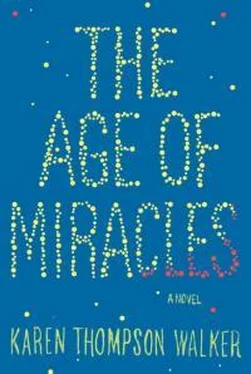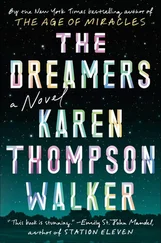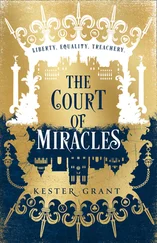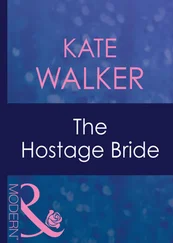When I got close to the girl, I could see that it was true. It was Hanna, all right. She was sitting at a lunch table, all alone, with no lunch.
“You’re back,” I said.
“Hey,” she said in a casual way. She looked stylish and cute in dark jeans and a pink tank top. Silver hoops hung in her ears. Her hair was pulled back in a loose French braid. “We had to come home for my dad’s job.”
I waited for her to say something more. She didn’t. A girl’s giddy scream rang out from the lunch lines behind us.
“I’m so glad you’re back,” I said finally. I dropped my backpack on the ground and sat down at the table. “I was starting to hate coming to school.”
“In Utah we didn’t have to go to school,” she said. Her blue eyes were watching something behind me. “Everyone was kind of waiting around for, you know, the end. But my dad got tired of waiting.”
We’d been friends for years, but a new shyness had flowered between us. I felt as if she were some second cousin, the two of us stranded at a family reunion, connected in some loose way but with no idea what to say to one another. She’d only been gone for three weeks.
All around us, the roar of kids ebbed and flowed like an invisible tide. Hanna looked down at the table. She began to pick at a bit of peeling paint.
I caved: “Why didn’t you tell me you were back?”
“We only just got back yesterday,” she said. She bit down on the flimsy tip of her thumbnail. “Or maybe the day before.”
A few stars persisted on the horizon, but the day was turning brighter by the minute. I had to squint to see Hanna’s eyes.
“Why weren’t you at the bus stop this morning?” I asked.
“I slept over at Tracey’s.”
“Who’s Tracey?”
“Tracey Blair.”
She pointed to another Mormon girl I vaguely recognized from classes but did not know. This girl was walking toward us now, her figure hazy in the dawn light. She carried two burritos wrapped in plastic and two bottles of water. As she got closer, it became clear that she was wearing the same outfit as Hanna, same pink tank top and same silver hoops, same French braid dangling down her back.
I felt suddenly tense.
“You’re twins,” I said.
“We didn’t even plan it,” said Hanna. “Isn’t that funny?”
“Hi,” said Tracey, turning to me. She had giant brown eyes that seemed never to blink. I guessed from her careful stride and the calluses on her hands that she was some kind of gymnast.
“Tracey was in Utah for a while, too,” said Hanna.
“Hi,” I said.
Tracey spit out her gum and sat down. She slid one burrito across the table to Hanna.
“See?” said Hanna, pointing at the crowd of kids across the quad. “Now do you see what I mean?”
“Totally,” said Tracey. She leaned her head back in extreme agreement. “Totally.”
“What?” I said.
“Nothing,” said Hanna.
As the sun made its way up into the sky, Hanna told me a little bit about Utah. Her life there was not nearly as bleak as I had pictured. She told a complicated story involving a Mormon boy who lived next door to her aunt. One night this boy had popped the screen on Hanna’s window and climbed into her bedroom. They’d kissed while her sisters slept.
“Wow,” I said. I could think of nothing else to say.
“I still cannot believe that,” said Tracey. “How did nobody wake up?”
“I know,” said Hanna, her cheeks a sudden red. She was smiling but trying not to smile. “And we were on the top bunk.”
At last she asked how I had been.
There was a lot to tell. Nothing was going well. But on that day, Hanna didn’t feel like Hanna to me, and Tracey kept cracking her knuckles.
“Oh, I don’t know,” I said. “I’ve been okay.”
Tracey’s fat shiny eyes were watching me closely. Every few seconds came the sound of her small joints popping.
“I’m double-jointed,” she said as she started on her left hand.
“Actually,” I said, “things have been great here. Really great.”
Tracey and Hanna exchanged a quick glance.
The bell rang, and Hanna groaned. “Man, I wish I was still in Utah, don’t you?”
“Totally,” said Tracey. “Totally.”
We stood and heaved our backpacks onto our shoulders. The two of them began to drift away from the table.
“See you later,” I said, but they didn’t hear me, or they didn’t seem to. They were already walking toward the science labs together, their strides in sync. I was walking in that direction, too, but I took the long way and walked alone.
At soccer practice that afternoon, Hanna showed up late and barely spoke to me. This was the same field where once we had gossiped nonstop between drills, but on this day, she spoke my name just once, and only as a forward addressing a midfielder during the scrimmage: “Julia,” she called out as the ball spun at my feet. “Over here. I’m open.”
Afterward, while we waited, sweaty and red-faced, to be picked up by our mothers, Hanna played with her phone.
“Want to come over this weekend?” I asked.
“I can’t,” she said.
I didn’t like the way she didn’t look up from her phone while she talked. I was sure she was sending messages to Tracey, who, no doubt, was sending similar communiqués right back.
“Why are you being like this?” I said.
“What do you mean?” she said. She smiled a little and bit her lower lip. Her long blond braid dangled on her shoulder. She wouldn’t look me in the eye. “I’m not doing anything.”
Something about the coyness in her face felt familiar. In that moment I recalled a pale redhead named Alison who had been Hanna’s best friend before me. This was years earlier, fourth grade, but I remembered the way Alison used to float toward us on the playground sometimes, how Hanna would ignore her while we practiced our tricks on the bars where there was room for only two. “I’m so sick of her,” Hanna would say to me whenever she saw Alison approaching, and then she would look at Alison with the same fake smile that she was now using on me.
That night I was too upset to fall asleep. I remember getting up at some late hour and cutting apart the bracelet I’d been making for Hanna. Then I dropped the scraps along with the charm bracelet she’d given me into a shoe box and shoved it into the back of my closet. Afterward, I felt no better at all.
The days passed. Clock mornings, clock nights. Darkness and light drifted overhead like passing storms, no longer tethered to our days or our nights. Dusk sometimes descended at noon; the sun sometimes didn’t rise until evening and then reached its highest point in the middle of the clock night. Sleeping was difficult. Waking was harder. Insomniacs walked the streets. And still the earth turned, slower and slower by the day. While my mother stockpiled candles and survivalist handbooks, I developed survival skills of a different sort: I was learning to spend time alone.
“Why don’t you go over to Hanna’s?” my mother would say in the afternoons. “I’m sure she’d love to see you.”
But Hanna was always with Tracey these days.
“Clock time won’t last,” said Sylvia at my weekly piano lesson. Her living room glowed against the dark. It was three in the afternoon and pitch-black outside. Seth didn’t show up for his lesson that day. I didn’t know why, and Sylvia didn’t say.
“You’ll see,” said Sylvia. “We’ll go back to real time eventually. Trust me.”
But I was not convinced that we would go back. Instead, I sensed that someday, if we survived, we’d be telling stories of how it once was on Earth.
One thing that strikes me when I recall that period of time is just how rapidly we adjusted. What had been familiar once became less and less so. How extraordinary it would seem to us eventually that our sun once set as predictably as clockwork. And how miraculous it would soon seem that I was once a happier girl, less lonely and less shy.
Читать дальше












